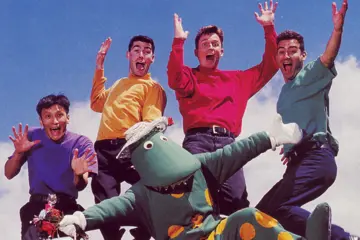House music transcends generations, defying the boundaries of language, culture and class to unite people like only it can. It exists solely as a conduit for positivity – a means to an end whereby that “end” is simply happiness; to dance and connect with likeminded souls, to immerse yourself in a world disconnected from reality, and to wholeheartedly embrace being your truest self.
This energy is what’s kept Simon Lewicki eating, sleeping and breathing house music for the past three decades. Better known to his hordes of adoring fans as Groove Terminator, Lewicki cut his teeth minting mixtapes of punk and rock bands, before falling in love with dance music and hip-hop at the turn of the 1990s. His debut album Road Kill arrived in 2000 – the same year he made an appearance in Ministry Of Sound’s coveted Club Nation series.
Lewicki soon became a staple among Ministry Of Sound’s devout following, popping up on a handful of compilations and in the mid-2010s, linking up with them to launch the ambitious Ministry Of Sound: Orchestrated concert series (whereby house, rave and club hits were reshaped and performed by full orchestras).
His latest show is even more ambitious, teaming up with the legendary Soweto Gospel Choir – three-time Grammy-winners best known for their work with the likes of Aretha Franklin, Stevie Wonder, Bono, Queen and Celine Dion – for the generation-spanning History Of House. The one-of-a-kind performance covers the entire story of house music, from its humble roots in the ‘70s disco scene to the cultural cornerstone it is today. The message behind it is simple: since the very beginning, house music has been about healing, freeing and liberating.
Don't miss a beat with our FREE daily newsletter
Next month, Lewicki and the Soweto Gospel Choir will take History Of House to Sydney – or more specifically, to the idyllic North Head clifftops in Manly – for this year’s Night At The Barracks program. The show itself (booked in for the night of Friday October 6, with tickets available here) will be one for the ages, sure to leave crowds high on life and ready to seize it.
With just a few weeks to go before we see it for ourselves, we sat down with Lewicki to learn all about the History Of House show, how the genre shaped his life and has the power to connect people all around the world – and of course, what the future of house music might look like...
How did you develop the concept for the History Of House show?
Watching the Soweto Gospel Choir’s show FREEDOM at the Sydney Opera House gave me loads of inspiration for a theme for our show. The choir are of course spiritual, and most (if not all) members are religious, so having these sorts of themes when I was making my pitch was probably a catalyst for how the whole collaboration came to life. These ideals are universal, so for them to resonate with the choir and me as the overarching theme and a foundation – also having a good feeling about what sort of songs you'd want to perform with one of the best gospel choirs in the world – really shone a bright light on certain songs that would be ideal to use.
In the beginning of the process of working out what songs to include, it was interesting to note that there were several recurring themes – [we went for] songs that in general terms are usually uplifting, joyous compositions, and lyrically usually about standing up, finding love and finding your people – which in turn lends itself rather well, if I do say so myself, to the virtual explosion of joy, happiness and good feelings [I get performing] live onstage with Soweto Gospel Choir.
What was it like to link up with the Soweto Gospel Choir and develop the show alongside them? Was it a very collaborative process?
Incredible! I could hardly believe I was in actual Soweto, working with THE Soweto Gospel Choir every day! A big part of the show’s success comes down to Dini, the choir’s music director, and Shimmy, the choir master, being able to translate my DJ ideas into actual music ideas that the choir could use.
The show is pretty much four continuous pieces of music, and to create four-part harmonies to that would be pretty overwhelming for most people, to say the least. But Dini has taken absolutely everything I’ve thrown at him and made it all work wonderfully. The soloists really go all out to make their parts stand out in the show. I also have to give a massive shoutout to the whole management and production team – Toni, Andrew, Allan and everyone at AKA – they are an awesome group of people to work with. Working with Soweto Gospel Choir is undoubtedly one of the most rewarding things I've done in my life.
What’s the biggest lesson you’ve been able to take away from your time spent with the Soweto Gospel Choir?
I'm in constant awe of everyone in the choir with the sheer amount of talent on display. Also, as I get to know the choir individually, a little bit at a time, [I learn] their own stories and what each person leaves at home and has sacrificed or given up for their art. It’s absolutely humbling and inspiring to be around such a family – because that's what it is, a family.
The first History Of House show was staged in 2020. Has it changed or evolved much over the past three years?
For sure! In 2020, when we first started, I felt it was very much me and then the choir two rows behind me; now it's all of us together in two rows, which dovetails into the show's themes of unity, love, respect, peace and so on. We've since incorporated full choreography for the whole set, which really has been a game-changer in terms of the energy of the performances. And the crowd just can't seem to get enough of the electric features and solos that happen. You also get to see a super fun, cheeky side of the choir that's incredibly infectious and fun to be around.
Through this performance, you’re showing the audience that house music has the power to connect people across generations and communities that are otherwise so different to each other. What is it about house music that you think makes that possible in the first place?
I'm living proof that house music has the power to connect. I mean, look at me! I’m a DJ from Adelaide and I’m working with three-time Grammy winners Soweto Gospel Choir! Like Chuck Roberts says, “House music is a universal language, spoken and understood by all.”
Reflecting on your own history with house music, how would you say it’s shaped who you are and how you view the world today?
House music has shaped who I am as a DJ, artist and musician. My first paid gigs as a DJ were because I was really into this fresh new sound coming out called house music (and also hip hop), and 35 years on I still get excited by something as simple as a piano riff and bassline that just loops on repeat for several minutes, or some crazy sound design that drops into a grin-inducing groove! I feel a person's taste in music can say a lot about them, and when people say they don't like house music – or dance music in general – I can get pretty suss on their character. Like, who doesn't like dancing!?
The late great Maxi Jazz has a line, “This is our church, this is where we heal our hurts.” This has alway resonated very deeply with me. I found “my people” on the dancefloor, and I think people can relate to that – that's really History Of House in a nutshell.
What keeps you excited about house music in 2023?
Since my trip to South Africa in 2020, I've been vibing hard with all things Amapiano! One [member] of the choir, Ten Ten, was playing the Samthing Soweto and DJ Maphorisa hit Akulaleki while we were in the car one day, coming back from a full day of workshopping the show, and the combination of hypnotic groove and incredible jazz chords, with this epic, mournful, soulful, beautiful music, with endless amounts of swagger... It was a new sound! It completely bowled me over. It sounds like the future to me and It's pretty great for dancing to. We’re referencing elements of Amapiano production in the recordings we have coming out soon, which I'm incredibly excited about.
Having grown your career over several decades, watching house music evolve as a genre and culture in realtime, I’m super curious to know: what do you think house music will look like in 10, 20 or even 30 years from now?
I really hope I have no idea what it's going to sound like, because I want something to look forward to! The globalisation of the DJ stars and music trends is still feeling exciting. All seemingly once far-off places are all having their moment, while at the same time respecting and having an understanding of what's come before them. Seeing how that all presents in their artistic statement, [and] is constantly evolving, [is a] fascinating thing to have a ringside seat for.
















